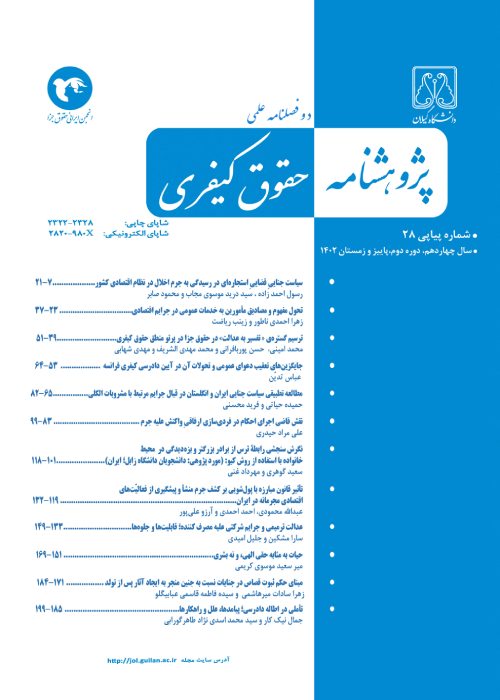Judicial Interpretations of the Concept of "Consent" in rape; Content analysis of Iran and New Zealand Cases*
"Rape" is defined in common legal system as a "sexual relationship with a woman through the use of force, coercion and pressure and against her consent". The current research aims to explain the concept of "consent" in sexual assault in light of judicial practice in the legal systems of Iran and New Zealand. In the field part of the current research, which was carried out using the descriptive-analytical method, qualitative content analysis method with a targeted sampling of 40 criminal cases with the subject of sexual assault in the courts of Iran (between 2003 and 2017) and New Zealand (between 2007 and 2018) has been used. The findings show that things such as male gender stereotypes, differences in the level and amount of satisfaction, differences in the quality of acquaintance of the parties, etc., are among the criteria that guide judges' understanding of the concept of consent in sexual assault cases.
Despite this duality, it is difficult to accept that punishment, as a social institution with a multiple reality, is only influenced by one of the two phenomena of power and culture. Punishment is a social institution that is influenced by them in a systematic relationship with other social phenomena and, of course, affects them.
The fundamental question of this research is how to present a realistic picture of the quality of the interaction between the phenomena of culture and power in the realm of punishment.
The present study tries to answer this fundamental question. The concern of the present research is to provide a framework for a systematic and multiple understanding of punishment. Presenting this framework can provide us with a more accurate picture of the nature and functions of punishment in the social Rape as a crime against physical integrity has always faced harsh criminal reactions. In traditional laws of rape, the principle is on coercion and reluctance using violence to rape and attack a woman, and in most countries rape laws are still based on violence or threats to it; in fact, the perception of rape is its constant association with violence.
On the other hand, the basis of modern rape laws is non-consent, which means that any sexual activity with a person who is not satisfied with the relationship is considered a crime. In rape that is based on lack of consent, it is assumed that the sexual relationship is two-way and based on traditional gender roles based on the will of the parties, and in this relationship the woman has the right to accept or reject it. Therefore, the core of the definitions of aggression is violence, coercion and reluctance, or violence and lack of consent, or both of them.
Since in the modern legal approach to rape, the lack of consent plays a key role in its realization, so one of the main issues is to determine the legal meaning of consent.
The present research, according to its nature requires the interpretation of textual data, and the researcher has used "qualitative" methodology, and its nature is descriptive-analytical. In order to access the necessary data regarding Iran's cases, the researcher referred to the Public Prosecutor's Office and the Revolution of Tehran, the Library and Document Center of the Judiciary Research Institute, etc. Access to court cases in New Zealand was made possible with the help of one of the professors of the Faculty of Law of Auckland University and during the Research Opportunity at Auckland University. The method used to interpret the data in this qualitative research is content analysis.
Although the difference between the legal sources of Iran and New Zealand and the existence of stereotypes and rape myths in the minds of judges, especially in traditional systems such as Iran, makes comparison and matching difficult, but by examining the codes from the cases of Iran and New Zealand, categories were obtained that could be similar. They provided the search and comparison between the two countries.
These categories that were obtained by examining the cases of Iran and New Zealand are:1- Judges' gender stereotypes from the history of friendship and previous acquaintance between the criminal and the victim.
2- Sexual and moral history of the victim in the context of judicial interpretations.
3- Men's judicial interpretations of the victims' resistance and its examples.
The root of the difference in the approach of the judges in the two legal systems depends on the difference in the legal and ideological foundations. On the other hand, the cultural roots and the deep influence of male stereotypes and ideas on the legislative system and the approach of judges have caused a different understanding of the concept of consent in the judicial system of the two countries.
As a conclusion from this article, the following can be considered:First. The mental stereotypes of the judges, regarding establishing a relationship between the level and history of familiarity with consent/non-consent, are among the most important strategies of judges regarding the interpretation of the concept of consent. Based on this, the general approach of the judges is that the existence of previous acquaintance/communication between the aggressor and the victim is practically interpreted as the consent of the victim to have sex. This issue is practically irrelevant in the New Zealand legal system due to the legality of consensual sexual relations (which naturally does not require prior acquaintance in many cases) and due to the acceptance of marital rape in the legal system of this country.Second. The existence of a bad sexual and moral history of the victim is another factor that judges in the light of which confirms the consent of the victim to establish sexual relations with the aggressor. This issue is not well accepted in the New Zealand judicial system and on the contrary, the victim's bad history has caused her to be considered as a more vulnerable person and has justified the need to support her.Third. The existence of male judicial interpretations of the issue of sexual assault, taking into account cases such as focusing on the victim's defense or lack of self-defense against the aggressor, whose lack of defense, even in cases where the victim surrendered due to fear of further harm, in They have considered the concept of satisfaction. This issue is also considered in the New Zealand legal system with a different approach, and the lack of physical resistance against the aggressor is not considered a proof of consent.Fourth. The existence of the death penalty for the perpetrator of sexual assault can be another reason for the desire of judges to present a patriarchal interpretation of the concept of consent, whether it is that life-threatening punishments are not very popular, both from the perspective of social and criminal effects, and judges consciously or unconsciously They do not want to use this punishment.
- حق عضویت دریافتی صرف حمایت از نشریات عضو و نگهداری، تکمیل و توسعه مگیران میشود.
- پرداخت حق اشتراک و دانلود مقالات اجازه بازنشر آن در سایر رسانههای چاپی و دیجیتال را به کاربر نمیدهد.




